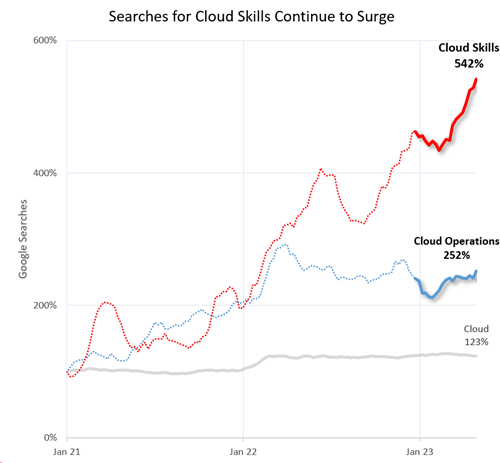It’s almost twenty years since AWS publicly launched its first infrastructure service. Those early days of Cloud were chock full of promise: no more hardware ownership to worry about; scale infrastructure up and scale down, paying only for what you use. In many ways that headline promise has been realised.
Much of the last two decades has been spent exploring the ever growing range of technologies and services. Tech teams have had a field day and Cloud is now the accepted platform for firms to use when building services to use and to deliver to customers. Cloud life isn’t that simple, though. The operational practicalities of relying on Cloud leave those early aspirations far behind in the rear view mirror.
It all kicks off when the Devs have released their code
The available talent is being stretched all over the place by new demands for digital expertise. The last five years have seen a surge of new digital businesses in Space. Carmakers are swallowing tens of thousands of software engineers as the digitalisation of vehicles ramps up. The FinTech boom might have peaked, but now AI has exploded and it is creating a flood of demand for skills.
Once the Devs have released their code, though, the firms launching in these sectors depend on Cloud infrastructure and operations skills to run these new services, day-to-day, and deliver to customers. That creates more demand for skills: Cloud skills.
 …and the demand for Cloud skills is surging
…and the demand for Cloud skills is surging
I’ve just updated the research I did some months ago into the demand for Cloud Skills. The update since the start of 2023 is shown in bold. The trends are stark.
- Cloud Operations has established itself as a key activity: settled around x2.5 since January 2021.
- Cloud Skills has powered ever upwards and has seen a new surge this year: up x5.5 in the last 28 months and showing no sign of abating.
The drivers are worth examining because none of them look as though they’re going to slacken off any time soon to provide relief for hard pressed firms and their decision makers in the C-Suite.
But there’s no escaping what has to be done somehow
Cyber
hackers are everywhere and the threats are growing in volume and sophistication. Data loss is often not the problem. We’ve seen massive intrusions that hyjack infrastructure and cause a crippling surge in cost when security has been undercooked. All this drives the need for constant specialist care and attention to firewalls, black-lists and all the other security mechanisms.
Incident Response
stuff happens, always, and usually at the worst possible times. Reputations are at stake. So the objective is to see the problem, stop it escalating, and to fix it before anyone else notices.
Eyes On Glass
it’s all too easy for costs to get out of hand and infrastructure performance to fall short, because no one has been watching what’s going on and jumping on growing issues before they go critical.
Housekeeping
every day there are things to be done, updates, patches, fixes, adjustments. All the ordinary things that un-sung heros do to reduce the outages and blockages that disrupt service, and make sure that the the wheels turning properly.
Compliance
regulations are getting tighter, and more complex and diverse, and this impacts architecture and infrastructure, driving the need for experienced people to ensure firms are not caught out by the rules as they and the firms themselves change.
Costs
they’re like a caged animal, always trying every possibility to break out and cause mayhem. The traps are often hidden, so experience is as important as expertise.
All these factors, as well as the growing complexities and continual change, drive the need for specialist Cloud skills. The reasons for that need aren’t going away, and everyone else needs them too. The C-Suite has to find answers quickly, before services suffer and reputations get damaged along with the budget and operating plan.
Just don’t get the chefs to maintain the kitchen equipment
Support for the infrastructure is not a core source of value for most firms, just as restaurants don’t create value through keeping the kitchen equipment clean and running. Like chefs, internal tech teams should be focused on doing the things that wow the customers. The management of the infrastructure isn’t where these guys excel and is almost never what excites them: wrong mind-set, it’s not what they do best, their value to the business is higher elsewhere.
Organizations can partner with specialist Cloud support firms like Flexiion, who have the right experienced professionals with the Cloud skills needed to run infrastructure, day-to-day. This releases payroll and workload for things that create more value for the business and its customers. Instead of trying to do everything, firms can concentrate on what they do best.
By joining forces with support organizations like Flexiion, firms who rely on Cloud can have the right skills and experience in partnership to help them develop and manage their Cloud-based systems more economically and with greater flexibility and scalability than growing payroll.
Peter is chairman of Flexiion and has a number of other business interests. (c) 2022, Peter Osborn
